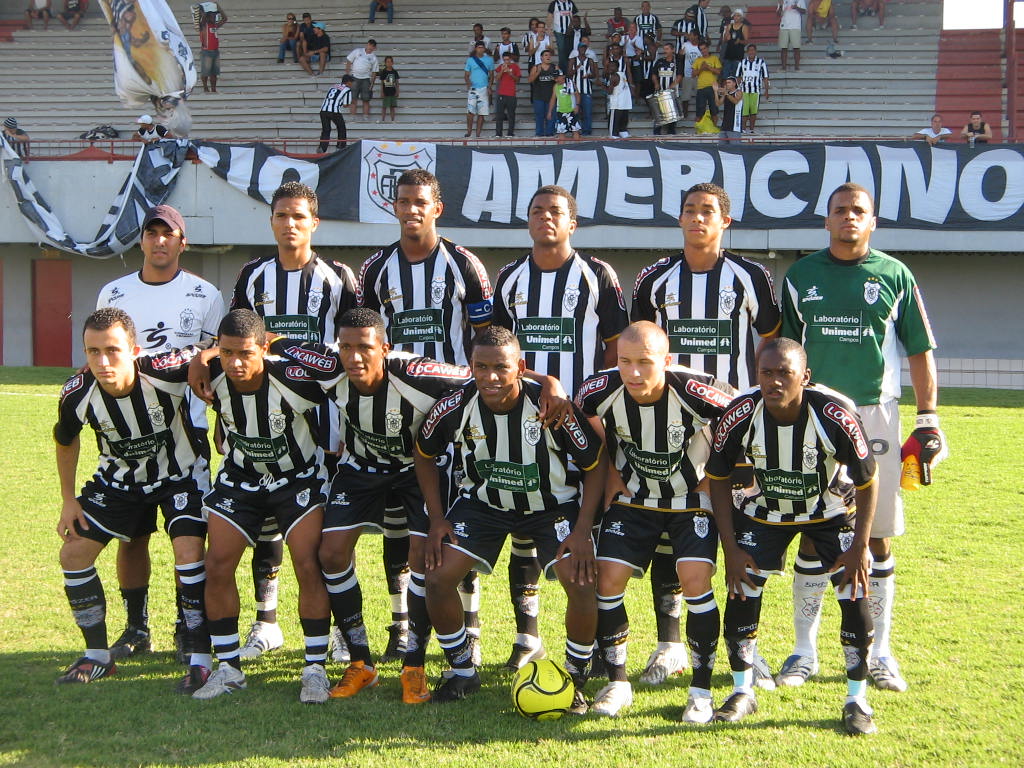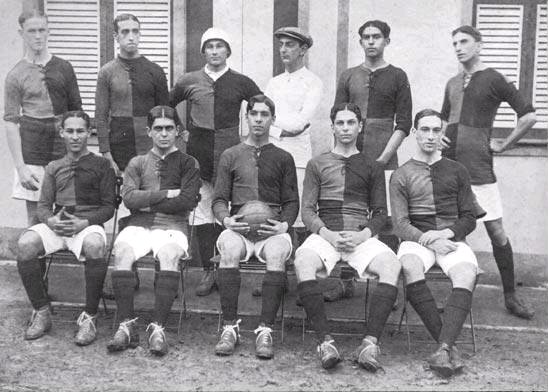|
América Football Club (RJ)
America Football Club, usually abbreviated to America-RJ or simply America, is a Brazilian football team based in the city of Rio de Janeiro, in the northern neighborhood of Tijuca. The team compete in Campeonato Carioca, the top tier of the Rio de Janeiro state football league. Founded on 18 September 1904, the club competed in the Campeonato Brasileiro Série A several times, winning the state championship seven times. The club's home stadium is the Estádio Giulite Coutinho, which has a capacity of 16,000. They play in red shirts, white shorts and red socks. The football anthem composer Lamartine Babo was a supporter of America. America's mascot is a devil. America also sponsors a beach American football team, the America Red Lions. History On 18 September 1904, Alberto Koltzbucher, Alfredo Guilherme Koehler, Alfredo Mohrsted, Gustavo Bruno Mohrsted, Henrique Mohrsted, Jayme Faria Machado and Oswaldo Mohrsted founded America Football Club. In 1905, America, ... [...More Info...] [...Related Items...] OR: [Wikipedia] [Google] [Baidu] |
Estádio Giulite Coutinho
Estádio Giulite Coutinho, also known as Estádio Édson Passos, is a multi-use stadium located in the city of Mesquita, Rio de Janeiro State, Brazil. It is used mostly for football matches and hosts the home matches of Fluminense, America Football Club and Nova Iguaçu. The stadium has a maximum capacity of 13,544 spectators and was built in 2000.Estádio Giulite Coutinho at América Football Club's official website History The stadium was inaugurated on January 23, 2000, when America beat a Rio de Janeiro State Combined Team by 3–1. The first goal of the stadium was scored by Rio de Janeiro State Combined Team's Sorato.[...More Info...] [...Related Items...] OR: [Wikipedia] [Google] [Baidu] |
Botafogo De Futebol E Regatas
Botafogo (local/standard alternative Brazilian Portuguese pronunciation: ) is a beachfront neighborhood ('' bairro'') in Rio de Janeiro, Brazil. It is a mostly upper middle class and small commerce community, and is located between the hills of Mundo Novo, Dona Marta (which separates it from Laranjeiras) and São João (which separates it from Copacabana). The word Botafogo also refers to a Latin American ballroom dance move, named so because the area of Botafogo is where it originated. Etymology Botafogo was named after João Pereira de Sousa Botafogo (1540–1627), who was responsible for the galleon ''Botafogo'''s artillery. Because of that, he received the nickname "Botafogo" and included it in his family name. When he went to live in Brazil, the Portuguese Crown granted him the land known today as Botafogo. The name literally means "set it on fire" in Portuguese (a reference to the ''Botafogo'' galleon's artillery power). In the mid-19th century, English language spea ... [...More Info...] [...Related Items...] OR: [Wikipedia] [Google] [Baidu] |
Americano Futebol Clube
Americano Futebol Clube, or Americano as they are usually called, is a Brazilian football team from Campos dos Goytacazes in Rio de Janeiro, founded on June 1, 1914. They play in black and white stripes, black shorts and socks. History The club was founded on June 1, 1914 by the Uruguayan Bertoni brothers, after watching a game between America and a Campos combined team, won by 3-1 by the former. The club was originally planned to be named América Football Club, after America of Rio de Janeiro. In 2002, Americano won both the Taça Guanabara and the Taça Rio, but was defeated by Fluminense in both legs (2-0 and 3-1) of the Campeonato Carioca final. In 2004, Americano reached the final four of the Brazilian Série C, but finished in the third position, after União Barbarense and Gama, and was not promoted to the Série B. Titles *Taça Guanabara: 1 ::2002 *Taça Rio: 1 ::2002 * Copa Rio: 1 ::2018 *Campeonato Fluminense de Futebol (Former Rio de Janeiro state Football ... [...More Info...] [...Related Items...] OR: [Wikipedia] [Google] [Baidu] |
Campeonato Carioca (lower Levels)
The Campeonato Carioca (Carioca Championship), officially known as Campeonato Estadual do Rio de Janeiro (Port., Rio de Janeiro State Championship), was started in 1906 and is the annual football championship in the state of Rio de Janeiro, Brazil. It is under the authority of the FERJ or FFERJ (Football Federation of the State of Rio de Janeiro). The first season of the ''Campeonato Carioca'' was played in 1906. It was predated by: the Campeonato Paulista of São Paulo and the Campeonato Baiano of Bahia. Rivalries amongst four of the most prestigious Brazilian teams (Botafogo, Flamengo, Fluminense and Vasco da Gama) have marked the history of the competition. The oldest clubs from Rio de Janeiro ( America, Botafogo, Flamengo, Fluminense, São Cristóvão, Vasco da Gama) had inspired the creation of many clubs from other states. Flamengo leads the title count with 37 championships, followed by Fluminense (32), Vasco da Gama (24), Botafogo (21), America (7), Bangu (2), Sã ... [...More Info...] [...Related Items...] OR: [Wikipedia] [Google] [Baidu] |
Taça Guanabara
The Taça Guanabara, or Guanabara Cup, is a football tournament organized annually since 1965 by the Rio de Janeiro State Football Federation. In its first four editions (1965, 1966, 1967 and 1968), the Taça Guanabara was a tournament in its own right, unrelated to the Rio de Janeiro league, and the winner would represent Rio de Janeiro in the Taça Brasil de Futebol national league competition. From 1969 onward, the cup became the first round of the Rio de Janeiro state league. Since 1982, the winners of the Taça Guanabara would play the winners of the Taça Rio in the Rio de Janeiro state championship final, with the exceptions of 1994 and 1995. The most successful team in the tournament's history is Flamengo, who have won 23 times. Current format Sixteen teams qualified from the state of Rio de Janeiro are divided into two groups of eight teams. The traditional "Big Four" teams in the state, Botafogo, Flamengo, Fluminense and Vasco da Gama, are seeded. Two of the four ... [...More Info...] [...Related Items...] OR: [Wikipedia] [Google] [Baidu] |
Guarani Futebol Clube
Guarani Futebol Clube, colloquially called Guarani, is a Brazilian association football club in Campinas, São Paulo. Guarani is the only club from Brazil's countryside to have won the top tier of the Brazilian Championship. The team currently play in the Série B, the second tier of Brazilian football, as well as in the Campeonato Paulista Série A1, the top tier of the São Paulo state football league. It is also known as Bugre, a popular term for an Indigenous Brazilian, and its supporters are known as ''bugrinos''. History Guarani Football Club was founded on April 1, 1911, in the city of Campinas, São Paulo, as Guarany Foot-Ball Club, by the initiative of 12 students from the Gymnasio do Estado (now Culto à Ciência). The students, including Pompeo de Vito, Hernani Felippo Matallo and Vicente Matallo, usually played football at Praça Carlos Gomes. Vicente Matallo became Guarani's first president. Guarani was named after maestro Antônio Carlos Gomes' opera "Il ... [...More Info...] [...Related Items...] OR: [Wikipedia] [Google] [Baidu] |
Clube De Regatas Do Flamengo
Clube de Regatas do Flamengo (; English: ''Flamengo Rowing Club''), more commonly referred to as simply Flamengo, is a Brazilian sports club based in Rio de Janeiro, in the neighborhood of Gávea, best known for their professional football team that plays in Campeonato Brasileiro Série A, as well as Campeonato Carioca. The club was first established in 1895 specifically as a rowing club and did not play their first official football match until 1912. Flamengo's traditional uniform features red and black striped shirts with white shorts, and red and black striped socks. Flamengo has typically played their home matches in the Maracanã, the national stadium of Brazil, since its completion in 1950, with some exceptions in recent years. Since 1969, the vulture (Portuguese: ''urubu'') has been the most recognized mascot of Flamengo. Flamengo established themselves as one of Brazil's most successful sports clubs in the 20th century during the era of state leagues in Brazil w ... [...More Info...] [...Related Items...] OR: [Wikipedia] [Google] [Baidu] |
Brazilian Football Confederation
The Brazilian Football Confederation ( pt, Confederação Brasileira de Futebol; CBF) is the governing body of football in Brazil Brazil ( pt, Brasil; ), officially the Federative Republic of Brazil (Portuguese: ), is the largest country in both South America and Latin America. At and with over 217 million people, Brazil is the world's fifth-largest country by area .... It was founded on Monday, 8 June 1914, as , and renamed Confederação Brasileira de Desportos in 1916. The football confederation, as known today, separated from other sports associations on 24 September 1979. Between 1914 and 1979 it was the governing body, or at least the international reference, for other olympic sports, such as tennis (until the Brazilian Tennis Confederation, CBT was founded in 1955), Sport of athletics, athletics (until the Brazilian Athletics Confederation, CBAt was founded in 1977), handball (until 1979), Swimming (sport), swimming and waterpolo. It currently has the most win ... [...More Info...] [...Related Items...] OR: [Wikipedia] [Google] [Baidu] |
Torneio Dos Campeões
Torneio dos Campeões ( en, Tournament of the Champions) was an official Brazilian football competition, promoted and organized by CBF in 1982. A group of 18 Brazilian professional football clubs participated in this tournament, including all the champions and the runners-up of all official national competitions ever played in Brazil up to that year ( Campeonato Brasileiro, Torneio Rio-São Paulo, Torneio Roberto Gomes Pedrosa) and America-RJ, 18th ranking in the CBF ranking, and Santa Cruz Futebol Clube, ranked 19th in the same ranking. America-RJ and Santa Cruz replaced Flamengo, who declined the invitation in favor of a world tour. Participants The tournament The teams were divided in four groups in the first two rounds, two groups with 5 teams and two groups with four teams in a home-away system. The group champions for each of the two rounds advanced to a quarterfinals bracket. Results The following teams advanced to the quarterfinals: *America-RJ *Atlético Mineiro ... [...More Info...] [...Related Items...] OR: [Wikipedia] [Google] [Baidu] |
1971 Campeonato Brasileiro Série A
The 1971 Campeonato Brasileiro Série A (officially the Primeiro Campeonato Nacional de Clubes, "First National Championship of Clubs") was the first official Brazilian football championship, and 15th edition overall of the Série A following the Taça Brasil and Torneio Roberto Gomes Pedrosa tournaments (which have been considered by the Brazilian confederation as valid national tournaments since 2010). Organized by the Brazilian Confederation of Sports (CBD), it was won by Atlético Mineiro. While the tournament represented the top tier of Brazilian football, its name was "Division Extra", with "First Division" instead used by the second-tier tournament (since known as Campeonato Brasileiro Série B). Background During the 1960s, two tournaments were used to pick Brazil's representative at the Copa Libertadores: Taça Brasil (1959-1968), a single-elimination tournament between the state champions; and Torneio Roberto Gomes Pedrosa (1967-1970), divided in two separate gro ... [...More Info...] [...Related Items...] OR: [Wikipedia] [Google] [Baidu] |
1971 In Brazilian Football
The following article presents a summary of the 1971 association football, football (soccer) season in Brazil, which was the 70th season of competitive football in the country. Campeonato Brasileiro Série A Final Stage Clube Atlético Mineiro, Atlético Mineiro declared as the Campeonato Brasileiro champions. Campeonato Brasileiro Série B Semifinals North-Northeastern Zone Central-Southern Zone Final ---- ---- ---- ---- Villa Nova Atlético Clube, Villa Nova declared as the Campeonato Brasileiro Série B champions by aggregate score of 4–2. Promotion No club was promoted to the following year's first level. State championship champions Youth competition champions Other competition champions Brazilian clubs in international competitions Brazil national team The following table lists all the games played by the Brazil national football team in official competitions and friendly matches during 1971. References Brazilian competitions at RSSSF ... [...More Info...] [...Related Items...] OR: [Wikipedia] [Google] [Baidu] |


